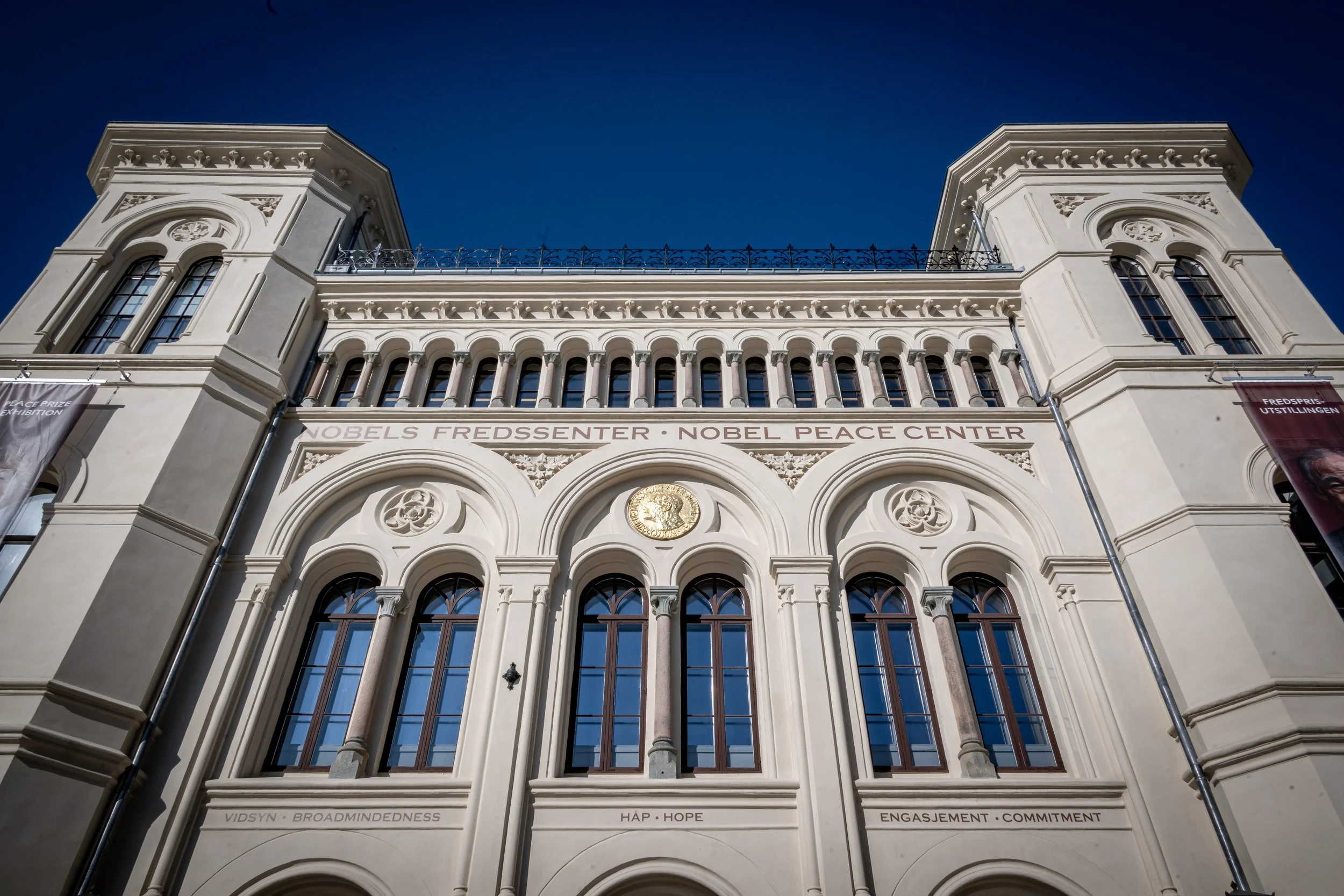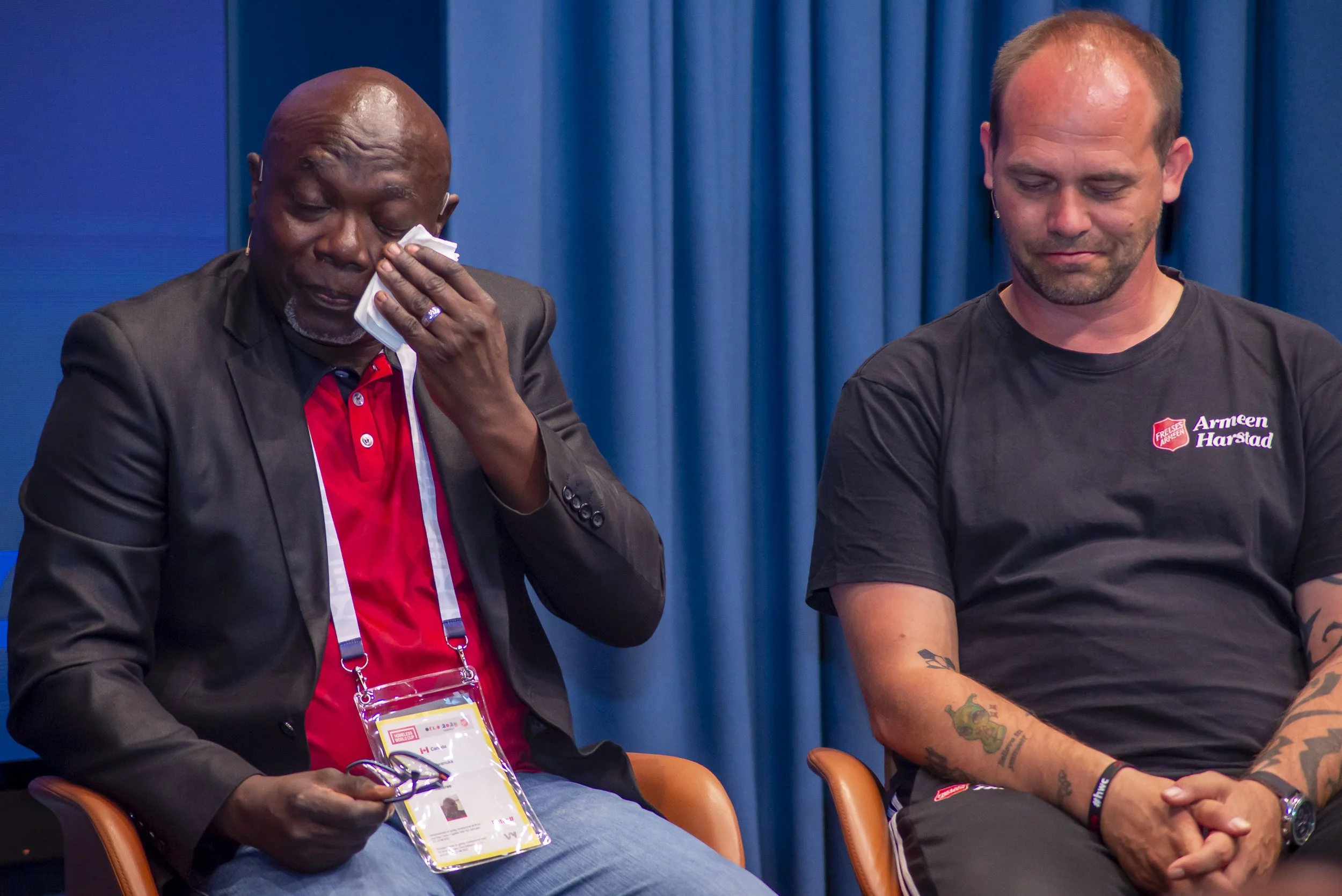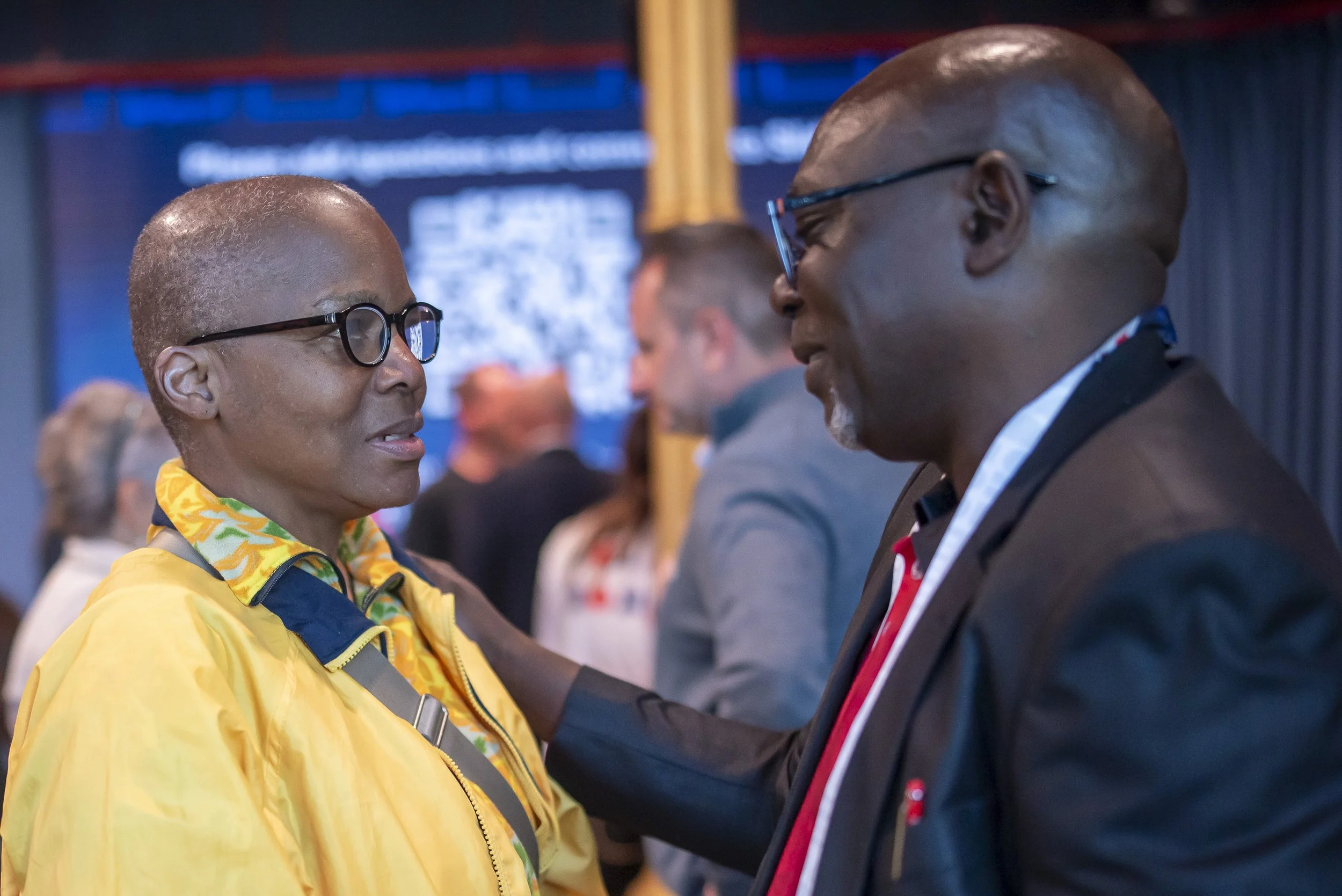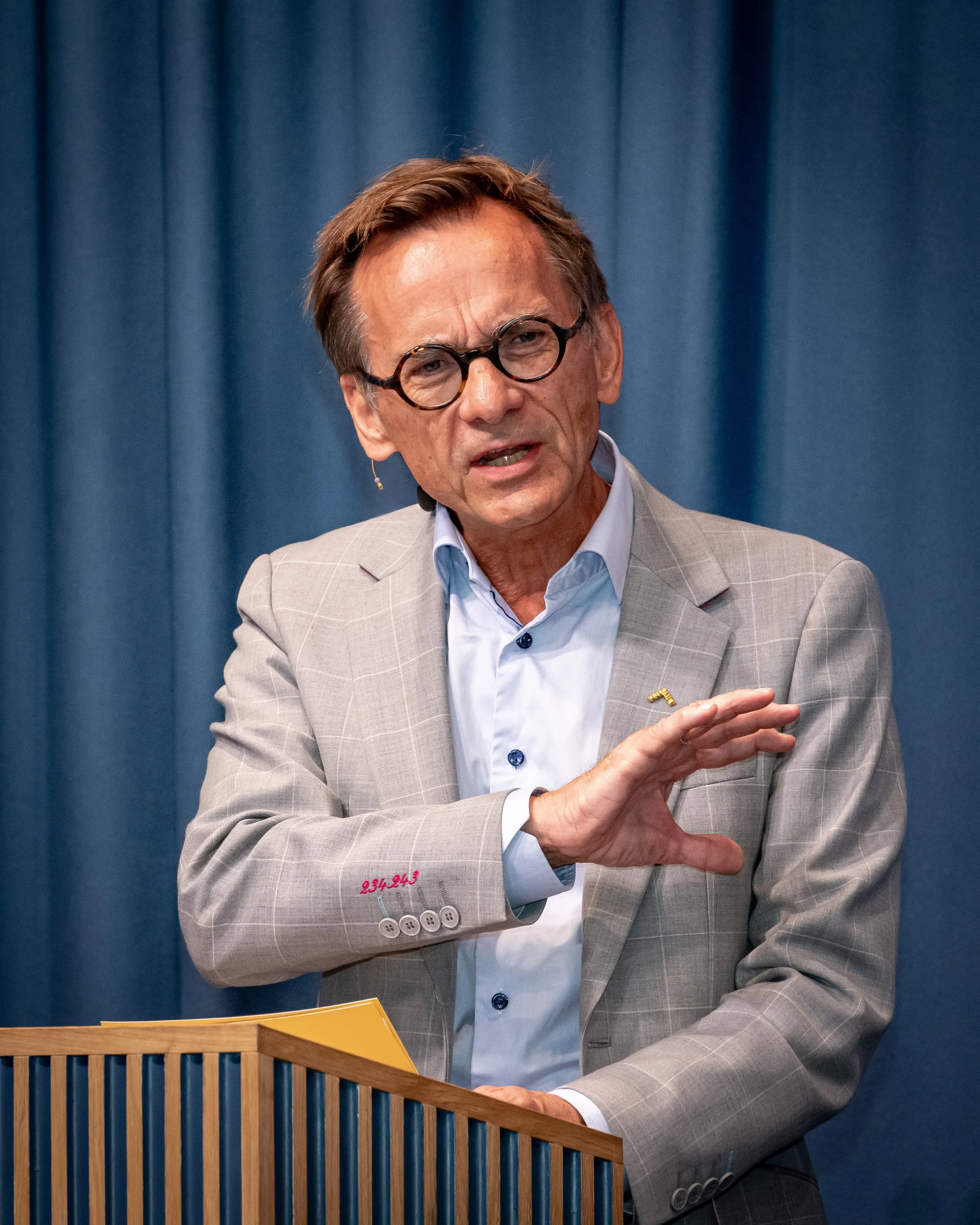Faith, Hope and Clarity in Oslo
While the cheers, laughter and low-flying footballs had been reverberating around Radhusplassen all weekend, the business end of Oslo 2025 Homeless World Cup officially kicked off in the Nelson Mandela Room at the city’s waterfront Nobel Peace Centre this morning. It was an apt location for the gathering, where a quote from late South African President and Peace award’s recipient is etched on its walls.
“The best weapon is to sit down and talk.”
With a carefully curated week of events ahead, the Salvation Army Norway welcomed Vice President for Social Impact & Innovation at Oslo Metropolitan University, Carl Thodesen to moderate the first full day of sessions. Carl has also made his involvement a family affair, volunteering his dad as volunteer liaison for the Egypt team at the tournament!
Before introducing the opening speakers, Carl welcomed the packed crowd of delegates to the third Cities Ending Homelessness Forum, with the greeting, “The Homeless World Cup is a celebration of second chances, humanity and awareness…a feeling of being together, being accepted and being in the moment.
“Today is about what it means to be homeless and breaking some of the prejudices.”
Lighting up the big screen from 7,700km away, Ahn Byunghun (Big Issue Korea Executive Director) conveyed his message of support, encouraging Norway to continue building the legacy, “Now the flame of hope is passed to Oslo.”
He was followed by President Lee Ki-jeong of Seoul’s Hanyang University, where last year’s event took place, who recalled, “It was more than a football event…it reminded us that true education goes beyond the classroom and that with empathy and solidarity we can create opportunities for all.”
Mayor of Oslo - and now staunch Homeless World Cup supporter - Anne Lindboe then addressed the group, harking back to Saturday’s opening parade and how, “heart-warming it is to see so many people with such passion for this strange little ball!”
After outlining what the city itself was implementing to help tackle homelessness she applauded the Homeless World Cup as, “a perfect example of not hiding what is difficult, creating a new future for many.”
Twenty years ago, the Salvation Army in Norway sent its country’s first team to a Homeless World Cup tournament and the organisations have maintained strong links since, with Oslo hosting the event in 2017 and again this year. Head of Salvation Army Social Services, Wenche Walderhaug Midjord, then took the floor, underlining that although football as a sport unites the world’s population, football as the driver of the Homeless World Cup, “is a commitment built of a deep belief of everyone and their potential in life…a belief in the hope of change for a better tomorrow.”
This week’s Forum, she continued, “is a meeting of people with warm hearts and wise minds.”
Christen Krogh (Oslo Met University Rector) added his welcome to the delegates, stating his hope for this week’s Forum would be that, “the language of academia and the language of football will change the world, one goal at a time.”
Goals - both physical and metaphorical - have been Homeless World Cup Foundation’s co-founder and President, Mel Young’s life for over 25 years and he wound up the Forum’s opening session with a mantra familiar to many who have heard him speak over the years: “Football is a common language - all you need is a ball - and it has the power to unite people.”
These Forums, he added, had come about due to his growing concern that although there was plenty of talk around the issues of homelessness there was not enough action. Underlining that as the financial cost of homelessness had been calculated at $30k per person per year - which alone equated to Homeless World Cup tournaments saving society around $15m annually - “interventions are not only about the lives of people, it makes financial sense not to have homelessness at all.
“We need other players - academics, the public sector, universities - to create preventions, to stop people getting into these situations…we’re trying to create a compendium of ideas which merit discussion to end homelessness. And the voice of the homeless themselves it vital.”
As an apt rendition of their composition, Not the Only One, by the Beyond Belief Band faded out, that voice of the homeless took to the stage in the shape of four former players whose lives had been transformed by their participation in the Homeless World Cup. Their stories, from the heartbreaking to the heartwarming, were heard against a backdrop of compassion and respect; a quiet sob, a sharp intake of breath and outbursts of supportive applause their only punctuation marks.
Anita Eriksen related how she had played football as a child but addiction as an adult had sent her into a downward spiral. Now clean for five years, and a player for Norway in Sacramento 2023, “football has helped me find the little girl I lost for 25 years; it’s helped me to remember who I wanted to be.”
A Team Norway player in Seoul 2024, Henriette Johansen, who had struggled with mental health issues and had anxiety issues with being around other people, cites football as enabling her now, “to be able to open up, share, and kind of enjoy people. Many say I’m now a different person.”
Ugandan born Canadian former player, and now referee, Ed Kiwanuka-Quinlan gave an impassioned account of his escape from a torturous regime in his country of birth to rebuild his life in Canada, only to lose it again when demons resurfaced. Feelings of desperation which almost caused him to end his life led him to the Salvation Army and the saving grace of a game of football. “That’s how street soccer saved my life.
“My inspiration to referee came from the late Hary Milas (Australian HWC referee) who awarded me his Whistle of Hope when I was a player in Mexico City 2012 after a match with Wales. Hary told me it should inspire me to go home and become a better person.
“We talk a lot about giving back, at the Homeless World Cup, but I think we continue to take, to receive love and support as part of this global family.”
Helge Dahlberg, a Norwegian player in Mexico 2018 echoed those sentiments, adding that speaking at the Forum was a full-circle moment. Becoming involved with the wrong crowd and the wrong substances as a young man, addiction was a big part of his life for over 20 years, “though I’ve played soccer since I was four, no matter what, never missing training or a game.
“Having left rehab for the last time, after being homeless and slept outside in temperatures of minus 20, I joined Street Soccer in 2018 and my life has gone upward since then. Working now with people in the same situation as I was helps me keep my life better by helping others.”
So to the Forum, and the talking, listening and problem-solving starts now – but what are the practical solutions that might go some way to help these global issues. Back to the people who really know what works:
“More effective and individual support is needed; putting everyone in a hostel together as they work through their issues is not the answer.” (Anita)
“Creating more funds and programmes so everyone can participate.” (Henriette)
“Those in positions of authority have to come up with policies that support people down on their luck.” (Ed)
“Building more houses is one thing but we need to build more homes, and build things that give people something to live for.” (Helge)
Delegates of the third Cities Ending Homelessness Forum, the people have spoken. And these are the people who know, the people with a story, the people who it’s vital to listen to if we’re going to change the world.
Words by Isobel Irvine | Photos by Anita Milas and Donnie Nicholson
The Forum is on all week and the full schedule can be found on the Oslo 2025 Cities Ending Homelessness Forum Schedule page.













